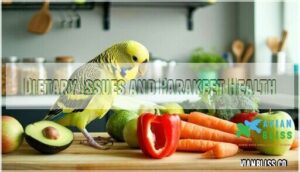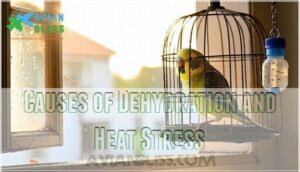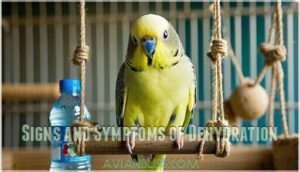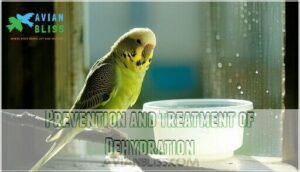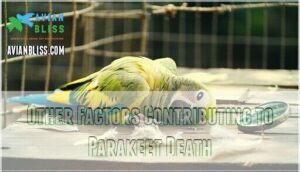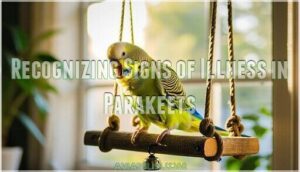This site is supported by our readers. We may earn a commission, at no cost to you, if you purchase through links.

Respiratory issues from toxic fumes, household cleaners, or Teflon cookware can kill within hours. Nutritional deficiencies, especially all-seed diets lacking vitamins, weaken their immune systems.
Accidental poisoning from chocolate, avocado, or common houseplants proves fatal quickly. Dehydration during hot weather or illness can trigger organ failure.
Bacterial infections spread rapidly in birds’ fast metabolisms. Trauma from ceiling fans, windows, or other pets causes internal injuries.
Night frights can lead to fatal crashes in dark cages. Understanding these hidden dangers and recognizing early warning signs could save your feathered friend’s life, preventing fatal outcomes.
Table Of Contents
- Key Takeaways
- Common Causes of Sudden Parakeet Death
- Accidental Poisoning in Parakeets
- Dietary Issues and Parakeet Health
- Dehydration and Heat Exposure in Parakeets
- Other Factors Contributing to Parakeet Death
- Recognizing Signs of Illness in Parakeets
- Preventive Measures for Parakeet Owners
- Importance of Veterinary Care in Parakeet Health
- Frequently Asked Questions (FAQs)
- Why is my parakeet dying?
- Can a parakeet die prematurely?
- What happens if a parakeet dies without warning?
- Can parakeets die from dehydration?
- What to do if a parakeet dies suddenly?
- Why are parakeets so dangerous?
- How do parakeets act before they die?
- What do you do when your parakeet dies?
- What is the life expectancy of a parakeet?
- How do I know if my parakeet is about to die?
- Conclusion
Key Takeaways
- Remove toxic household items immediately – Teflon cookware, air fresheners, scented candles, and cleaning products release fumes that can kill your parakeet within hours through respiratory failure.
- Provide proper nutrition beyond seeds – All-seed diets lack essential vitamins and create nutritional deficiencies that weaken your bird’s immune system, while toxic foods like avocado, chocolate, and onions cause sudden death.
- Watch for subtle behavioral changes – Your parakeet will hide illness until it’s severe, so monitor for fluffed feathers, reduced vocalization, lethargy, or changes in eating habits as early warning signs.
- Schedule regular vet visits every six months – Avian veterinarians can detect hidden diseases, respiratory infections, and other health issues before they become life-threatening emergencies.
Common Causes of Sudden Parakeet Death
Parakeets can pass away suddenly due to several critical factors that often go unnoticed by owners.
Understanding these common causes helps you recognize warning signs and take preventive action to protect your feathered companion.
Respiratory Problems and Solutions
When respiratory problems strike your parakeet, they’re often fighting for their life. Aspergillosis and respiratory infections from moldy feed or poor ventilation can quickly turn fatal. Toxic fumes from Teflon, cigarette smoke, and aerosols cause immediate breathing issues and lung disease.
Silent killers lurk in every home—respiratory problems strike fast and deadly.
Watch for these warning signs:
- Tail bobbing with each breath
- Open-mouth breathing or wheezing
- Nasal discharge or sneezing
- Ruffled feathers during rest
- Lethargy combined with respiratory distress
Air pollution devastates bird respiratory systems, making prevention essential through proper ventilation and toxin avoidance. Understanding respiratory infection risks is key to protecting your parakeet’s health.
Nutritional Deficiencies and Prevention
Poor nutrition strikes faster than you’d think. Malnutrition Risks escalate when your parakeet’s Dietary Needs aren’t met, creating Nutrient Deficits that weaken their immune system and can trigger sudden death.
Your bird’s parakeet nutrition needs go beyond basic seeds. A parakeet diet lacking variety becomes a ticking time bomb for parakeet health issues.
Here’s what proper nutrition looks like:
- Colorful veggie medley: Bell peppers, carrots, and leafy greens provide essential vitamins
- High-quality seed mix: Variety prevents nutritional gaps
- Protein-packed foods: Cooked egg or mealworms (in moderation)
- Fresh fruits: Apple slices or berries offer natural nutrients
Vitamin Supplements can help, but whole foods work better. Watch for Food Allergies and avoid toxic foods for birds like avocado, chocolate, and onions. Parakeet poisoning from improper diet kills more birds than owners realize.
Feed consistently, provide fresh water daily, and monitor eating habits closely. Ensuring a balanced diet is essential for preventing nutritional deficiencies, which involves understanding key nutrient deficiencies to keep your parakeet healthy.
Infections and Diseases in Parakeets
Silent killers lurk in your parakeet’s world—infections that can strike without warning. Parrot Fever spreads through airborne particles, while Bacterial Diseases attack weakened immune systems. Viral Outbreaks can devastate flocks rapidly, and Fungal Infections thrive in humid conditions.
Invisible threats strike without warning—your parakeet’s biggest enemies hide in plain sight.
Watch for subtle changes: fluffed feathers, Respiratory Issues, or altered droppings signal trouble.
| Infection Type | Common Symptoms | Prevention Tips |
|---|---|---|
| Parrot Fever | Lethargy, green droppings | Regular vet screenings |
| Bacterial Diseases | Ruffled feathers, weakness | Clean water daily |
| Viral Outbreaks | Appetite loss, isolation | Quarantine new birds |
| Fungal Infections | Breathing difficulties | Control cage humidity |
| Respiratory Infections | Tail bobbing, open-mouth breathing | Avoid drafts, temperature swings |
Early detection saves lives—these parakeet health issues often progress rapidly to parakeet sudden death.
Accidental Poisoning in Parakeets
You might be surprised to learn that everyday household items pose serious poisoning risks to your parakeet.
Common products like cleaners, candles, and air fresheners contain volatile organic compounds that can cause sudden death in birds due to their sensitive respiratory systems, which is a serious risk.
Household Cleaners and Chemicals
Your everyday household cleaners pack a deadly punch that can kill your parakeet in minutes. Toxic fumes from bleach, ammonia, and all-purpose cleaners contain volatile organic compounds (VOCs) that overwhelm their tiny respiratory systems faster than you’d think possible.
Air fresheners aren’t invigorating for birds—they’re toxic substances waiting to strike. Plug-ins, sprays, and scented candles release household toxins that cause accidental poisoning before you notice symptoms.
Chemical poison doesn’t discriminate between dirt and your pet’s delicate lungs. VOC exposure from aerosol sprays turns routine cleaning into a death sentence.
Switch to bird-safe alternatives like white vinegar and baking soda. When using stronger products, relocate your parakeet to fresh air. Your feathered friend’s life depends on making this simple swap. Understanding the risks of toxic household cleaners is vital to preventing these tragic incidents.
Toxic Plants and Their Effects
Many household plants pose serious plant toxicity risks to your parakeet, turning your home into a potential minefield of deadly blooms and toxic leaves.
Common culprits like philodendron, dieffenbachia, and amaryllis contain compounds that can cause severe bird poisoning within hours of ingestion.
Your curious parakeet doesn’t know that beautiful lily or that trailing ivy represents fatal greens waiting to strike.
These poisonous flowers and toxic substances work through different mechanisms—some cause immediate oral swelling and breathing difficulties, while others trigger heart problems or neurological symptoms.
- Oxalate-containing plants like philodendron cause painful mouth swelling and potentially fatal airway obstruction
- Cardiac glycoside plants such as oleander and foxglove disrupt heart rhythm, leading to sudden collapse
- Alkaloid-rich varieties including nightshade family plants trigger seizures, paralysis, and neurological damage
Remove all toxic household items from your bird’s environment and replace them with bird-safe alternatives like spider plants or bamboo.
It’s essential to understand plant toxicology to protect your parakeet from potential threats.
Candles, Air Fresheners, and Paint
Your home’s scented products aren’t just masking odors—they’re potentially killing your parakeet. Toxic fumes from candles, air fresheners, and paint poison release volatile organic compounds (VOCs) that devastate bird respiratory systems.
These toxic substances cause sudden death before symptoms appear.
| Hazardous Product | Toxic Component | Fatal Risk Level |
|---|---|---|
| Scented candles | Paraffin wax fumes | Immediate death |
| Plug-in air fresheners | Chemical VOCs | Acute poisoning |
| Fresh paint | Lead compounds | Respiratory failure |
Even "natural" products pose chemical exposure risks to your feathered friend.
Dietary Issues and Parakeet Health
What you feed your parakeet can mean the difference between a long, healthy life and sudden tragedy.
Poor nutrition and toxic foods are silent killers that claim countless parakeet lives each year, often without any warning signs, and this can be considered a sudden tragedy.
Teflon Poisoning and Prevention
When heated to normal cooking temperatures, Teflon-coated cookware releases PTFE fumes that can kill your parakeet within minutes—even at recommended temperatures.
These toxic gases are invisible killers that cause sudden respiratory failure in birds.
Fume prevention starts with these safer alternatives:
- Stainless steel pans for everyday cooking
- Ceramic cookware for non-stick convenience
- Cast iron skillets for heat retention
- Glass baking dishes for oven use
Bird safety means eliminating nonstick cookware entirely from your kitchen. Understanding aerosol poisoning risks is vital for creating a safe environment for your parakeet.
Toxic Foods for Parakeets
Beyond cookware dangers, your kitchen harbors toxic substances that trigger parakeet sudden death within hours of ingestion.
Avocado Toxicity causes heart failure from persin compounds, while Chocolate Poisoning delivers fatal theobromine doses to tiny systems.
Garlic Risks and Onion Dangers destroy red blood cells, creating life-threatening anemia.
Three deadliest toxic foods include:
- Avocado – Even 3.5g kills a 35g budgie through cardiac arrest
- Chocolate – All types contain lethal theobromine concentrations
- Fruit pits – Apple, cherry, and peach seeds release cyanide when cracked
Caffeine Hazards multiply these risks exponentially.
Importance of Balanced Diet and Fresh Produce
Smart nutrition transforms your parakeet’s health from vulnerable to vibrant.
Nutrient balance through quality pellets, fresh fruits, and vegetable variety creates the foundation for longevity. Your bird’s parakeet diet should include colorful produce packed with vitamins A and K, plus natural antioxidants.
Water purity guarantees proper hydration while seed quality supports overall parakeet nutrition. This balanced approach to fresh produce strengthens immunity and prevents the malnutrition that often leads to sudden death.
A well-planned parakeet diet requires consideration of parakeet food options.
Fresh Veggies
Colorful Fruits
Quality Pellets
Dehydration and Heat Exposure in Parakeets
Your parakeet’s water dish might seem full, but dehydration can still kill within hours if they’re not drinking enough or exposed to excessive heat.
Heat stress and dehydration work together like silent assassins, causing rapid organ failure before you’ll notice the sunken eyes, dry beak, or lethargy that signal serious trouble, particularly due to heat stress.
Causes of Dehydration and Heat Stress
Dehydration strikes faster than you’d think, turning your cheerful parakeet into a medical emergency within hours.
Environmental factors like heat exposure and water deprivation create perfect storms for thermal stress.
- Monitor parakeet dehydration risks when temperatures exceed 85°F with high humidity
- Check water bottles twice daily – malfunctioning dispensers cause rapid dehydration signs
- Avoid direct sunlight exposure that triggers dangerous heat stroke episodes
- Maintain 60-75°F room temperature to prevent bird heat stress complications
Signs and Symptoms of Dehydration
When your parakeet’s water intake drops, their body sends distress signals you can’t ignore.
Watch for sunken eyes that appear hollow and dry beaks that feel rough to touch. Your bird’s skin loses elasticity – gently pinch it and healthy skin snaps back instantly, while dehydrated skin stays tented.
Dehydration signs include lethargy, weakness, and poor appetite as your feathered friend struggles with heat stress. These parakeet health problems often precede parakeet sudden death, making early recognition of bird dehydration symptoms absolutely essential for your pet’s survival.
Recognizing parrot health issues is vital for identifying underlying causes of dehydration and taking prompt action to prevent further complications.
Prevention and Treatment of Dehydration
Keep your parakeet’s Water Quality fresh by replacing it daily and placing multiple bowls throughout the cage.
Watch for Dehydration Signs like sunken eyes or lethargy.
During Heat Stress, offer electrolyte solutions to restore Electrolyte Balance.
If severe dehydration develops, contact your vet immediately for Fluid Therapy – early intervention prevents parakeet health problems and bird health issues from becoming fatal.
Other Factors Contributing to Parakeet Death
Beyond the common culprits of poisoning and poor nutrition, parakeets face several other serious threats that can lead to sudden death.
These include physical trauma from accidents, stress-induced heart failure, and various diseases that remain hidden until it’s too late, which can be considered as serious threats.
Trauma and Injuries in Parakeets
Your parakeet’s curious nature can lead to serious accidents that might catch you off guard. Flying accidents rank among the most common causes of parakeet trauma, with window collisions being particularly dangerous since birds can’t distinguish glass barriers.
Bird-proofing your home prevents most physical injuries before they happen. Common parakeet injuries include broken wings from cage mishaps, head trauma from ceiling fan encounters, and bruising from door accidents. Physical trauma can occur within seconds, making prevention your best defense.
- Close doors slowly – parakeets often perch on door frames and can get crushed instantly
- Cover windows with decals – prevents deadly window collisions during free-flight time
- Secure cage accessories – loose toys or poorly attached perches cause frequent cage injuries
Creating a trauma-free environment means thinking like your parakeet and identifying every potential hazard.
Night Frights and Prevention
Night Terrors can send your parakeet into a panic, causing dangerous thrashing and injuries.
Darkness Prevention starts with covering the cage partially, leaving ventilation while blocking sudden movements.
A dim nightlight reduces Bird Stress from unexpected sounds or shadows.
Cage Safety means removing sharp objects and securing perches to prevent falls during parakeet night frights.
Calming Techniques include consistent bedtime routines and night frights prevention through soundproofing nearby areas, protecting against parakeet sudden death from trauma.
Ensuring proper bird care advice is essential for creating a safe environment and preventing night terrors, which can be achieved by following guidelines on small bird care.
Diseases and Heavy Metal Toxicosis
While night frights can cause immediate trauma, heavy metal toxicosis and various diseases pose equally serious threats to your parakeet’s health.
Respiratory Infections from bacteria like Klebsiella and Pseudomonas can trigger septicemia, leading to sudden death. Fungal Diseases such as aspergillosis attack the respiratory system, while Avian Cancer like kidney tumors often goes undetected until it’s too late.
Metal Poisoning occurs when parakeets ingest lead, zinc, or copper from household items. Toxicosis Symptoms include:
- Lethargy and fluffed feathers
- Regurgitation and abnormal droppings
- Neurological signs like seizures
Toxic substances from old paint, stained glass, or costume jewelry are common culprits. Parakeet illness symptoms often appear subtle since birds hide weakness naturally. Parakeet disease causes range from viral infections to heavy metal toxicosis, making regular veterinary monitoring essential for early detection.
Recognizing Signs of Illness in Parakeets
Since parakeets naturally hide illness until they’re severely compromised, you’ll need to watch for subtle behavioral shifts like decreased vocalization, changes in eating patterns, or unusual posture.
Early detection through careful observation can mean the difference between successful treatment and sudden loss, making daily monitoring essential for every responsible owner, as it allows for the identification of issues before they become severe, highlighting the importance of subtle behavioral shifts.
Behavioral Changes and What They Mean
When behavioral changes occur in your parakeet, they’re often warning signs of underlying health issues. Social Withdrawal and Vocal Changes are particularly concerning indicators that shouldn’t be ignored.
Feather Plucking typically signals stress or infection rather than simple boredom. Beak Grinding can indicate pain, while excessive Wing Flapping may suggest respiratory distress.
| Behavior Change | Potential Meaning |
|---|---|
| Lethargy and decreased activity | Early illness or depression |
| Loss of vocalization | Respiratory disease or stress |
| Appetite changes | Various health concerns |
| Social withdrawal | Advanced illness progression |
| Stereotypical behaviors | Stress or medical distress |
These parakeet behavioral changes often precede parakeet sudden death. Recognizing parakeet warning signs before dying helps you identify bird stress and parakeet stress causes early, potentially saving your feathered friend’s life.
Physical Symptoms of Illness in Parakeets
Physical symptoms serve as your parakeet’s emergency signals when behavioral changes aren’t enough.
Watch for respiratory issues like labored breathing or tail bobbing.
Feather plucking creates bald patches, while beak problems include overgrowth or discoloration.
Eye infections cause discharge or swelling.
Drooping wings indicate weakness or injury.
These parakeet physical symptoms often precede parakeet sudden death, making early detection essential for parakeet health and parakeet disease prevention.
Importance of Regular Veterinary Check-Ups
Regular vet visits serve as your parakeet’s health insurance policy.
While you’ve learned to spot physical symptoms, proactive medical care prevents many emergencies before they start.
Your parakeet wellness exams should include:
- Complete physical examination – Weight checks, beak inspection, feather assessment
- Blood work analysis – Detecting infections, organ function, nutritional deficiencies
- Behavioral health review – Discussing eating habits, activity levels, social interactions
- Preventive measures planning – Vaccination schedules, parasite prevention, environmental safety
Schedule parakeet vet visits with an avian vet every six months.
These check ups catch hidden diseases early, when treatment works best.
Your parakeet regular veterinary care investment pays dividends through longer, healthier lives.
Preventive Measures for Parakeet Owners
Prevention is your best defense against sudden parakeet death. Creating a safe environment, maintaining proper nutrition, and scheduling regular vet visits can prevent most fatal emergencies before they occur.
Providing a Safe Environment
Creating a Toxic Free Home starts with strategic Bird Proofing your space.
Position your parakeet’s cage away from kitchens where Volatile Organic Compounds VOCs from cooking can harm their delicate respiratory system.
Maintain Safe Temperature between 65-80°F, avoiding drafts and direct sunlight.
Remove Hazardous Materials like aerosol sprays, scented candles, and household cleaners from the area.
Focus on Air Quality Monitoring by ensuring proper ventilation while eliminating toxic substances from household products that threaten your bird’s health.
Investing in air purification systems can substantially improve the overall air quality for your parakeet.
Nutrition and Hydration Essentials
Setting up proper parakeet nutrition doesn’t have to feel overwhelming. Your bird’s survival depends on getting the basics right, and small mistakes can lead to serious nutrient deficiency problems.
A balanced diet should consist of 60-70% high-quality pellets, with the remaining portion split between seeds and fresh food.
Here’s your essential feeding checklist:
- Daily Fresh Food: Offer dark leafy greens, carrots, and broccoli while avoiding toxic foods like avocado, chocolate, and onions
- Water Quality: Provide filtered water in both bottle and shallow dish, changing daily to prevent bacterial growth
- Healthy Snacks: Limit treats to 10% of total diet, choosing bird-safe fruits over processed options
Hydration essentials matter just as much as food choices. Dehydration kills faster than starvation, so monitor your bird’s water intake closely. Bird nutrition isn’t just about filling the bowl—it’s about creating a foundation for long-term health and preventing those sudden, heartbreaking losses.
Regular Veterinary Care and Check-Ups
Beyond keeping your parakeet well-fed and hydrated, scheduling vet visits twice yearly protects your feathered friend from hidden dangers. Avian vet specialists can detect subtle changes during bird exams that you might miss at home.
Think of health checks as your parakeet’s insurance policy – catching problems early saves both heartache and money. Your vet will create personalized care plans based on your bird’s age, diet, and environment.
| Routine Exam Components | What Your Vet Checks |
|---|---|
| Physical Assessment | Weight, posture, breathing |
| Behavioral Evaluation | Activity level, vocalizations |
| Medical Tests | Blood work, fecal samples |
| Environmental Review | Cage setup, diet analysis |
| Preventive Planning | Vaccination schedules, supplements |
Regular veterinary care isn’t just about treating illness – it’s about preventing sudden death through early intervention. Vet checkups establish baseline health markers, making future changes easier to spot. Parakeet veterinary care investments today prevent devastating losses tomorrow. Parakeet health depends on professional monitoring alongside your daily observations.
Importance of Veterinary Care in Parakeet Health
Finding the right avian veterinarian transforms your parakeet’s health outlook dramatically. Unlike general practitioners, avian specialists understand the unique physiology that makes parakeets vulnerable to sudden death from hidden illnesses.
Veterinary Checks should occur twice yearly, even for healthy birds. During these visits, your vet performs thorough physical examinations, weight monitoring, and Medical Tests like blood work to detect early disease markers. This proactive approach to parakeet veterinary care catches problems before they become life-threatening.
Essential services your avian vet provides include:
- Health Monitoring through regular wellness exams and diagnostic testing
- Bird Vaccines against common diseases like polyomavirus and psittacosis
- Emergency Care protocols for sudden illness or injury situations
Parakeet health depends on professional oversight because these birds instinctively hide symptoms until illness becomes severe. Your vet’s trained eye spots subtle changes in behavior, weight, or appearance that signal developing problems.
Establishing a relationship with an avian specialist before emergencies arise guarantees your bird receives immediate, appropriate care when parakeet sudden death threats emerge. This partnership becomes your strongest defense against preventable losses.
Frequently Asked Questions (FAQs)
Why is my parakeet dying?
Like a canary in a coal mine, your parakeet’s distress signals danger lurking nearby.
You’re likely facing toxic fume exposure, stress, poor diet, or hidden illness.
Check for Teflon cookware, air fresheners, temperature extremes, and dietary toxins immediately, as these can be signs of toxic exposure.
Can a parakeet die prematurely?
Yes, parakeets can die prematurely from toxic fumes, poor diet, stress, hidden diseases, or environmental hazards.
Their sensitive respiratory systems and tendency to hide illness make them vulnerable to sudden death from seemingly minor issues.
What happens if a parakeet dies without warning?
While one moment your feathered friend chirps happily, the next they’re gone—sudden parakeet deaths often result from toxic fume exposure, hidden illnesses, or stress-induced heart failure that you couldn’t detect beforehand.
Can parakeets die from dehydration?
Dehydration can quickly kill your parakeet. Without adequate water access or during excessive heat exposure, they’ll develop sunken eyes, dry beaks, and lethargy before potentially dying within hours.
What to do if a parakeet dies suddenly?
Strangely, even healthy parakeets can pass away without warning.
Don’t handle the body immediately—document the scene, contact an avian veterinarian, and consider a necropsy to determine the cause and protect any remaining birds.
Why are parakeets so dangerous?
Parakeets aren’t dangerous to humans, but they’re vulnerable creatures.
Their delicate respiratory systems make them susceptible to toxic fumes from household products, putting them at risk rather than making them risky.
How do parakeets act before they die?
Like canaries in coal mines signaling danger, your parakeet’s subtle changes whisper warnings before silence falls.
Watch for fluffed feathers, sitting low on perches, reduced appetite, labored breathing, and withdrawn behavior—these quiet distress signals precede their final moments.
These distress signals are crucial to recognize, as they can indicate serious health issues in your parakeet.
What do you do when your parakeet dies?
First, remove your parakeet from the cage and place it in a safe location.
Contact your veterinarian immediately to discuss necropsy options—this examination can reveal the cause of death and help prevent future incidents with other birds, which is crucial for understanding the situation and taking immediate action.
What is the life expectancy of a parakeet?
Wild parakeets typically live 5-10 years, but your feathered friend can reach 15-20 years with proper care, nutrition, and regular vet visits in captivity.
How do I know if my parakeet is about to die?
Watch for lethargy, fluffed feathers, sitting on cage bottom, labored breathing, loss of appetite, and sudden behavior changes. These warning signs often appear just hours before death in parakeets.
Conclusion
Like a silent predator stalking through your home, the causes of why parakeets die suddenly often hide in plain sight.
Your feathered companion depends on you to recognize these invisible threats before they strike.
From toxic fumes to nutritional deficiencies, each danger requires immediate attention and preventive action.
By understanding these seven shocking causes, you’re equipped to create a safer environment for your bird.
Remember, early detection and proper veterinary care remain your strongest defenses against sudden parakeet death.
- https://vcahospitals.com/know-your-pet/household-hazards-and-dangers-to-birds
- https://www.omlet.us/guide/parakeets/parakeets_in_the_home/disease/
- https://vetmed.illinois.edu/pet-health-columns/bird-toxins-teflon-avocado-lead-zinc/
- https://www.msdvetmanual.com/bird-owners/disorders-and-diseases-of-birds/disorders-affecting-multiple-body-systems-of-pet-birds
- https://www.youtube.com/watch?v=btGlXb5CBc0




